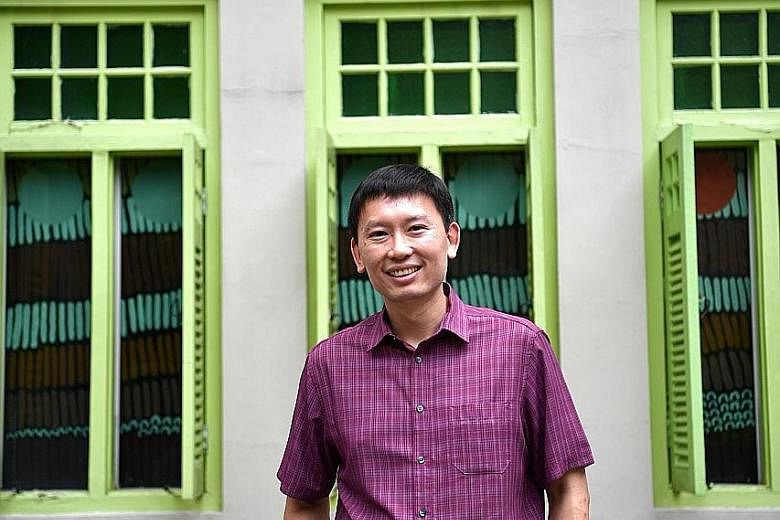Minister of State for Communications and Information, and Health Chee Hong Tat, 43, may be new to politics, but the former long-time civil servant has seen the Government change how it tells people about its policies over time.
Ministries have gone from stodgy press releases to snappy social media posts, YouTube videos and even specially commissioned informational drama series such as the Hokkien Jiak Ba Buay? for seniors.
Mr Chee tells Insight how he and his colleagues make sure messages don't get lost in the telling, why he doesn't think government communications is "wayang", and what it was like to cameo in a drama series.
Q What is one key shift in how the Government sees the role of communications?
A In the past we would focus more on getting the policy correct and implementing it well. But communications was sometimes left more as a "downstream" issue - after I have decided what to do, then I think about how to communicate it.
One of the shifts we have made is to recognise that communications is actually an integral part of policy formulation.
It needs to be factored in right from the beginning, including making adjustments to the policy, making it simpler. There will be trade-offs. If you make it simpler you may not be able to slice it so neatly, but it makes it easier for people to understand.
Q How much detail about a policy should you pack into a video or drama series?
A More doesn't mean better. If you put too much information into a show, nobody remembers anything.
Complicated issues like MediShield Life have lots of details so you have to plan how to get the message across. One of the things the Ministry of Health did was break it up into bite-size pieces. So in one ad, I'll focus on only one or two aspects: MediShield Life is something which is for everyone, it's for life, there is no age limit.
But I'm not going to go into all the nitty-gritty. I don't think we should expect people to remember all the details. The ad lets them know where to get help or find out more. But if you try to cram in too much information, the messages will get lost.
Q How does the Government tailor its message to different groups of people?
A Your content must be compelling, it must be engaging, it must be clear. It has to be something which people can relate to. The language that we choose and the format that we use are also customised to target audiences.
Quite a lot of behavioural science, research and data analysis goes into communications. After rolling out a certain product, we look at what has worked, what has not worked.
Q An obvious example is Jiak Ba Buay? - what feedback have you received about it?
A The most memorable was from seniors who told me, thank you for remembering us. Thank you for doing this to reach out to us. That kam cheng (Hokkien for connection) is very hard to describe and measure, but it's very important. Because part of communications is the emotional connection. It's not just about hard facts.
An additional benefit of doing it in dialect is we are speaking to seniors using a language they are most familiar with. So for them (there's) that intimacy.
Q Can you paper over a bad policy with good packaging?
A You can't do that. People will see through it in no time, right? We have an educated population. We have a society where information flows freely. You have social media, you have mainstream media.
It definitely will not go down well. To me, it's a non-starter, because to do that undermines your credibility and it's not good governance.
That's not the way we operate. If a policy has a problem or is no longer relevant, we will review the policy and improve it.
We have to start with a fundamental principle: to be credible and well accepted, communications has to be truthful, has to be accurate, has to be reliable.
If your starting point is... the policy itself is no good, or the programme is not well designed, communications alone is not going to help to solve the problem.
Communications can only come in to strengthen the message, reinforce the message if the policy and the programme are well designed to begin with. Communications is not a substitute for effective policy and good, well-designed programmes.
Q What would you say to people who dismiss such communications as "wayang" (putting on a show)?
A What we are doing here is communicating factual information to help people to better understand so that they are more aware of these schemes and how they can benefit.
I hope people (will not) be too cynical. I accept that some amount of scepticism is going to be there regardless of whether it's communications or any other policy area.
But I also believe that the majority of Singaporeans can see that we are very sincere in this effort to reach out, to connect, to explain our policies, and most importantly to help (them) to understand and to benefit from the policies.
Q You had a cameo in Jiak Ba Buay? as yourself, where you spoke with the characters and sang a Hokkien song to residents. What was it like?
A I enjoyed the opportunity to work with Royston (Tan, the director) and the cast and to see them in action.
Royston is quite strict. I posted a short clip on my Facebook with some of the bloopers. For some of the parts we had to re-shoot the whole scene. But it was fun.
I'm open to more acting if it helps achieve the objective of enhancing our communications and communicating with our audience.

